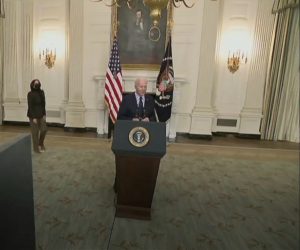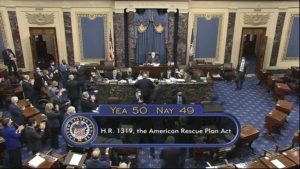approved a $1.9 trillion COVID-19 relief
WASHINGTON (AP) — Senate narrowly approved a $1.9 trillion COVID-19 relief bill Saturday as President Joe Biden and his Democratic allies notched a victory they called crucial for hoisting the country out of the pandemic and economic doldrums.
“This nation has suffered too much for much too long,” Biden told reporters at the White House after the vote. “And everything in this package is designed to relieve the suffering and to meet the most urgent needs of the nation, and put us in a better position to prevail.”
Saturday’s vote was also a crucial political moment for Biden and Democrats, who need nothing short of party unanimity in a 50-50 Senate they run with Vice President Kamala Harris’ tiebreaking vote. They hold a slim 10-vote House edge.

Not one Republican backed the bill in the Senate or when it initially passed the House, underscoring the barbed partisan environment that’s characterized the early days of Biden’s presidency.
In a significant sign, the chair of the Congressional Progressive Caucus, representing around 100 House liberals, called the Senate’s weakening of some provisions “bad policy and bad politics” but “relatively minor concessions.” Rep. Pramila Jayapal, D-Wash., said the bill retained its “core bold, progressive elements.”
“They feel like we do, we have to get this done,” Senate Majority Leader Chuck Schumer, D-N.Y., said of the House. He added, “It’s not going to be everything everyone wants. No bill is.”
When I took office, I promised help was on the way. Thanks to @SenSchumer and Senate Democrats, we've taken one more giant step forward in delivering on that promise.
I hope the American Rescue Plan receives a quick passage in the House so it can be sent to my desk to be signed.
— President Biden (@POTUS) March 6, 2021
In a written statement, Pelosi invited Republicans “to join us in recognition of the devastating reality of this vicious virus and economic crisis and of the need for decisive action.”
The bill provides direct payments of up to $1,400 for most Americans and extended emergency unemployment benefits. There are vast piles of spending for COVID-19 vaccines and testing, states and cities, schools and ailing industries, along with tax breaks to help lower-earning people, families with children and consumers buying health insurance.
Vaccine supplies are growing, deaths and caseloads have eased but remain frighteningly high, and hiring was surprisingly strong last month, though the economy remains 10 million jobs smaller than pre-pandemic levels.
Work on the bill ground to a halt Friday after an agreement among Democrats on extending emergency jobless benefits seemed to collapse. Nearly 12 hours later, top Democrats and West Virginia Sen. Joe Manchin, perhaps the chamber’s most conservative Democrat, said they had a deal, and the Senate approved it on a party-line 50-49 vote.

Under their compromise, $300 weekly emergency unemployment checks on top of regular state benefits would be renewed, with a final payment Sept. 6. There would also be tax breaks on some of that aid, helping people the pandemic abruptly tossed out of jobs and risked tax penalties on the benefits.
The House relief bill, largely similar to the Senate’s, provided $400 weekly benefits through August. The current $300 per week payments expire March 14, and Democrats want the bill on Biden’s desk by then to avert a lapse.
The Senate voted Friday to eject a House-approved boost in the federal minimum wage to $15 an hour by 2025, a major defeat for progressives. Eight Democrats opposed the increase, suggesting that Sen. Bernie Sanders, I-Vt., and other liberals pledging to continue the effort will face a difficult fight.
Party leaders also agreed to restrict eligibility for the $1,400 stimulus checks for most Americans. That amount would be gradually reduced until, under the Senate bill, it reaches zero for people earning $80,000 and couples making $160,000. Those ceilings were higher in the House version.
These included defeated efforts to bar funds from going to schools that don’t reopen their doors or let transgender students born male participate in female sports. One amendment would have blocked aid to so-called sanctuary cities, where local authorities don’t help federal officials round up immigrants in the U.S. illegally.



